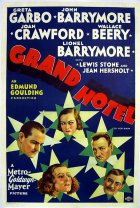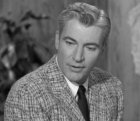
Grand Hotel Page #9
- NOT RATED
- Year:
- 1932
- 112 min
- 1,020 Views
She re-enters -- carrying a glass of water. She crosses,
places the glass down beside the bed -- her movements are
quick and furtive -- then she crosses, picks up the telephone --
asks for the theatre.
GRUSINSKAYA:
The Western Theatre --
She leaves receiver down -- crosses quickly to mirror --
stands there and brushes back her hair -- crosses back to
telephone speaks:
GRUSINSKAYA:
Western Theatre?
She glances up at the clock.
GRUSINSKAYA:
The stage -- Mr. Pimonov -- the ballet
master... Grusinskaya -- hurry --
hurry.
Again she puts the receiver down -- picking up a pencil she
commences hastily to scribble a note. She writes frantically.
Her other hand goes up and picks up the receiver.
GRUSINSKAYA:
Yes -- yes, I'm waiting.
She finishes the note -- commences suddenly to speak into
the telephone --
GRUSINSKAYA:
Hello, Pimenov? -- I'm at the hotel.
I couldn't go on -- I couldn't...
No, no don't --
(long pause)
...Just alone... Good night, good
night, my dear -- goodbye... Pimenov,
how is it going, badly?... Uh?...
Who's dancing?... Desprez?... Oh --
and how is it?... Oh, -- oh, I see --
they didn't miss me?... They didn't
miss me.
(she lets her hand
drop with the receiver
and goes on talking
into the air)
They didn't miss me -- good night,
Pimenov...
She is about to replace the receiver. She sits with it in
her hand, unreplaced.
The music has stopped. The room is strangely silent. Behind
her the Baron peers from the closet.
Her head sinks down upon her hands.
A funny, singing noise comes from the telephone. She lifts
the receiver to her ear. In a very strange voice, the voice
of Opehlia, she speaks:
GRUSINSKAYA:
(with great humility)
Oh -- I'm sorry, yes... I have
finished.
(she replaces the
receiver)
The foregoing scene is much better played than described. It
is in fact, ballet.
Quite calmly, Grusinskaya finishes the notes on the table.
She folds it up and places it in a prominent place on the
table, or hangs it over the telephone.
She crosses to the window pulls back the curtains -- the
Baron has been hiding behind a few minutes before.
We see the Baron watching. He glances at the door quickly.
"No, there is not time." She is returning calmly. She crosses
to the dressing table and takes the veronal out of a drawer.
She looks at it thoughtfully, her lips are trembling a little.
She moves to the radiator as if to seek warmth.
She sinks into a chair and her head droops over her folded
hands which contain the veronal, she seems to pray.
The Baron comes from the closet -- now is his chance, he
looks at the door but can't make it. Looks on the floor for
the key which Grusinskaya has previously thrown there, his
eyes fall upon the note on the telephone -- he reads it.
It is a death farewell note to Suzette -- do not insert it.
At this moment she has finished, the Baron returns to his
hiding place. She makes the sign of a cross and goes to her
bed.
She looks around nervously, apprehensively -- like a deer
who has heard something, then reassured. She places the
veronal on the night table beside the glass of water. She is
quiet and deliberate. She arranges the pillows under her
head and lies down. She reaches for the bottle of veronal
and empties it generously in her hand. She has to lean away
upon one elbow, from the Baron's position, in order to balance
herself.
The Baron steps like a cat from his hiding place. He goes to
the bedside noiselessly and stands there.
She reaches for the glass-her hand stretches out for the
glass. The Baron takes her wrist suddenly.
She turns quickly looking at him. The glass falls to the
floor with a crash and breaks. As she moves, the veronal
falls out of her hands upon the bed. She struggles up to a
sitting position.
BARON:
Please, do not be alarmed, Madam.
She glances up at him. She is bewildered. She seems to be
coming out of a trance. Again she wants to jump from the
bed.
BARON:
Careful -- there's broken glass on
the floor.
Now she becomes conscious of almost nakedness. She draws her
kimono tightly around her, glances across the wide expanse
of bed. We see her consider passing over that way, but she
is now a woman again -- a woman of the earth -- it would be
a silly movement.
BARON:
There.
(takes a pillow from
the bed throws it
upon the floor over
the glass, steps
back)
She gets up quickly and crosses, putting on her robe which
was lying across the back of a chair.
Her first movement is not one of alarm but of -- shame. She
draws her robe more closely around her and looks at the Baron
puzzled. She thinks, dreamily, "What is this?" She glances
back at the veronal and the bed showing us plainly that this
man must have watched her preparation for bed. We get a sense
of relief with her. She is trembling.
The Baron has controlled his nerves perfectly. He senses his
danger. He is caught red-handed with five hundred thousand
marks worth of pearls in his pocket. He is wondering if she
will ring the bell. For an instant he thinks of escape. He
could dash for the balcony. He could strike her dead or
silence her with threats. There is in the room an intoxicating
sense of romance and danger. (It should be in the scene.)
BARON:
Please do not be frightened, Madam.
GRUSINSKAYA:
(after a silence)
What do you want here?
BARON:
Nothing -- only to be here.
GRUSINSKAYA:
Why do you hide in my room?
BARON:
But surely you must know -- because
I love you.
GRUSINSKAYA:
Because you love me -- you love me?
She looks at him for a few moments and then suddenly she
throws herself upon the bed and begins to weep more and more
passionately.
BARON:
(going over to her)
Poor little Grusinskaya! Does it do
you good to cry? Are you afraid?
Shall I go?
GRUSINSKAYA:
I was so alone -- always alone --
and suddenly you were there and said
that.
(sitting up)
No. I am not afraid. It is strange.
BARON:
Don't cry -- it tears my heart to
see you sob like that.
GRUSINSKAYA:
(regaining control)
Nerves -- just nerves. You must
forgive me. I have had a bad evening.
I am very tired. Do you know what it
is to be tired -- tired of a routine
existence?
BARON:
I'm afraid not -- I usually do just
what I feel like doing at the moment.
A look in his eyes reminds her of the strangeness of the
situation. She rises with returning dignity and pulls her
robe around her -- she is becoming the Grusinskaya of Imperial
Russia; she is the woman Grand Dukes have fought for. She
sweeps across the room.
GRUSINSKAYA:
So you feel like coming into a lady's
room -- and you come... What now?
BARON:
(following her)
I'd like to smoke a cigarette.
GRUSINSKAYA:
Certainly.
She gets her cigarette box from the writing table and holds
it out to him. He takes a cigarette and lights it. She watches
him curiously. She smiles, as she watches him greedily inhale
the smoke. She crosses and sits before her looking glass.
She brushes her hair back and powders her face. She looks
Translation
Translate and read this script in other languages:
Select another language:
- - Select -
- 简体中文 (Chinese - Simplified)
- 繁體中文 (Chinese - Traditional)
- Español (Spanish)
- Esperanto (Esperanto)
- 日本語 (Japanese)
- Português (Portuguese)
- Deutsch (German)
- العربية (Arabic)
- Français (French)
- Русский (Russian)
- ಕನ್ನಡ (Kannada)
- 한국어 (Korean)
- עברית (Hebrew)
- Gaeilge (Irish)
- Українська (Ukrainian)
- اردو (Urdu)
- Magyar (Hungarian)
- मानक हिन्दी (Hindi)
- Indonesia (Indonesian)
- Italiano (Italian)
- தமிழ் (Tamil)
- Türkçe (Turkish)
- తెలుగు (Telugu)
- ภาษาไทย (Thai)
- Tiếng Việt (Vietnamese)
- Čeština (Czech)
- Polski (Polish)
- Bahasa Indonesia (Indonesian)
- Românește (Romanian)
- Nederlands (Dutch)
- Ελληνικά (Greek)
- Latinum (Latin)
- Svenska (Swedish)
- Dansk (Danish)
- Suomi (Finnish)
- فارسی (Persian)
- ייִדיש (Yiddish)
- հայերեն (Armenian)
- Norsk (Norwegian)
- English (English)
Citation
Use the citation below to add this screenplay to your bibliography:
Style:MLAChicagoAPA
"Grand Hotel" Scripts.com. STANDS4 LLC, 2024. Web. 21 Dec. 2024. <https://www.scripts.com/script/grand_hotel_865>.



Discuss this script with the community:
Report Comment
We're doing our best to make sure our content is useful, accurate and safe.
If by any chance you spot an inappropriate comment while navigating through our website please use this form to let us know, and we'll take care of it shortly.
Attachment
You need to be logged in to favorite.
Log In